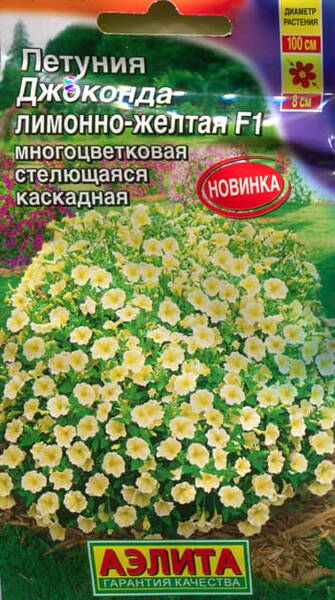Your shopping cart is empty!
Petunia "Gioconda Lemon-Yellow" F1
Cascading petunia "Gioconda Lemon-Yellow" F1 - Petunia multiflora.
Petunia of Italian selection by the company "Farao" with unrivaled characteristics. Thanks to the male sterility gene, it produces a stunning number of flowers and blooms continuously from spring to late autumn. Adapts to a wide range of temperatures - successfully withstands short-term frosts down to -5°C and extreme heat.
The hybrid forms powerful bushes 25-30 cm high with intensive branching. In width, they reach 60-80 cm, but with regular fertilizing they grow much larger.
Flowers with a diameter of 7-8 cm, are not damaged by rain and strong wind. Petunia of the Gioconda series is a serious competitor to surfinias, which can reproduce only vegetatively.
Will decorate flower beds, borders, hanging baskets and garden vases.
Seeds in granules! The granules are placed on the soil surface without covering them, and are well moistened with a spray. When moisture gets on the granule, the shell should dissolve. The crops are covered with glass to maintain constant humidity until full germination. February crops require additional lighting.
Petunia of Italian selection by the company "Farao" with unrivaled characteristics. Thanks to the male sterility gene, it produces a stunning number of flowers and blooms continuously from spring to late autumn. Adapts to a wide range of temperatures - successfully withstands short-term frosts down to -5°C and extreme heat.
The hybrid forms powerful bushes 25-30 cm high with intensive branching. In width, they reach 60-80 cm, but with regular fertilizing they grow much larger.
Flowers with a diameter of 7-8 cm, are not damaged by rain and strong wind. Petunia of the Gioconda series is a serious competitor to surfinias, which can reproduce only vegetatively.
Will decorate flower beds, borders, hanging baskets and garden vases.
Seeds in granules! The granules are placed on the soil surface without covering them, and are well moistened with a spray. When moisture gets on the granule, the shell should dissolve. The crops are covered with glass to maintain constant humidity until full germination. February crops require additional lighting.












